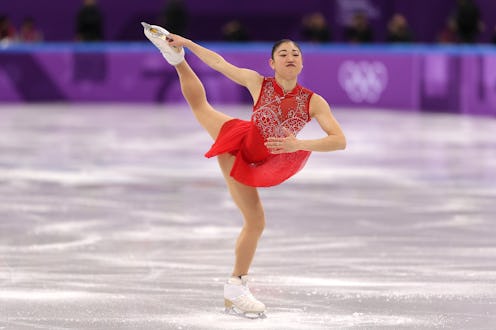Life
The Reason Some Olympic Events Are For “Ladies” Vs. “Women” Is More Complicated Than You Think

If you, like me, have had the Olympics on nonstop for the last week (even if it's just to catch a glimpse of one of Adam Rippon's sparkly tops), you may have noticed an interesting disparity in how commenters refer to women's sports. While some female athletes are competing in "women's" events, others are vying for top medals in "ladies'" events, which seems a tad outdated in 2017. So why are some sports labeled "ladies" and some "women"?
The Washington Post addressed that very disparity in a long piece on Monday, noting that figure skater Mirai Nagasu — who last week famously made history as the first American to land a triple axel at the Olympics — will compete in a "Ladies" figure skating event on Wednesday while women's hockey is called, well, women's hockey. But men's skating doesn't have the same old-fashioned label, which makes the women's nomenclature all the more questionable.
Indeed, the "Ladies" label dates all the way back to 1892, when the Switzerland-based International Skating Union drew up their Constitution and Regulations that regulated figure skating's rules. It made sense back in a more genteel era, but it is decidedly unsettling to hear in contemporary times, and some skaters, including former Olympian and current NBC correspondent Tara Lipinski, are hoping to get it changed.
“The term ‘Ladies’ has been long-standing in figure skating, and while I generally respect tradition in the sport, I do think the terminology has become antiquated and uneven, considering we refer to male skaters as ‘men,’” Lipinski told the Washington Post. “I would support a change from ‘ladies’ to ‘women.’”
Recently, commentators Scott Hamilton and Tanith Belbin White were involved in a Twitter exchange with a viewer who took issue with White referring to a "ladies."
"You are doing a great job, Scott, but the whole 'lady skater' thing from @TanithWhite is so irritating," the critic tweeted. "She is really devaluing her commentary with that. #womenpower#Olympics."
Hamilton, an Olympic gold medalist in his own right, agreed that the nomenclature was archaic, if technically correct, but he stood up for White. "I totally understand your point, but skating is a very old and traditional sport in many respects. When referring to the women’s competition, everywhere that it’s mentioned refers to it as Ladies. I know. I know. But @TanithWhite is correct. #letschangeit” he tweeted.
Other ladies-dubbed sports include alpine skiing, ski-jumping, speedskating, and snowboarding; "women's" sports include hockey, bobsled, and curling. The International Olympic Committee permits each disparate sport to have its own governing body, and they come up with the rules, hence why there's a discrepancy in how each sport is labeled.
Though NBC requires its commentators to call each event by its official name, some broadcasters, including the Canadian Broadcasting Company, will refer to women's sports as just that, regardless of whether they're technically considered "ladies'" events. "We have increased efforts around this topic over the last few years as it is important to the network as a global leader in sports broadcasting to also be leaders in terms of equity in how women’s and men’s sports are presented and reported on," Greg Stremlaw, executive director of CBC Sports and general manager for the Olympics, told the Washington Post. The IOC is reportedly looking into a potential name change as part of its Gender Equity Review Project, but that has yet to be confirmed.
Another fun gendered fact: women figure skaters rarely compete in pants, at least per a piece in The Atlantic last week. Though it's not against the rules, since skaters are judged on style, the tradition of women wearing skating skirts and dresses has stuck. “Synchronized swimming, figure skating, and ice dancing are some of the only sports where you have to look pretty while you do it,” skater Katrina Nelken told the Atlantic. “It’s hard to break from that after, what, 100 years of tradition?”